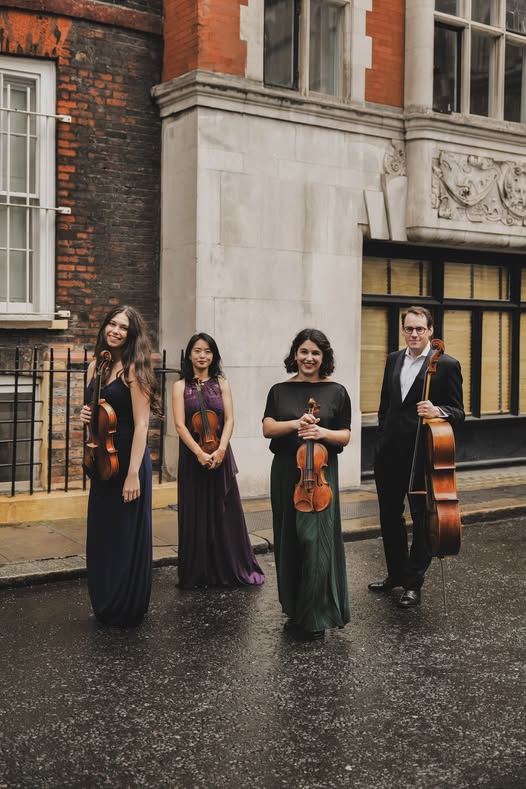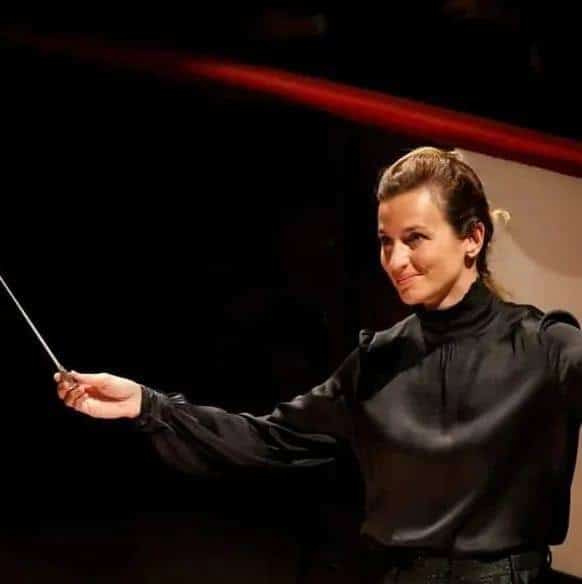Opera of the week tonight – The most German of German operas
OperaSlippedisc courtesy of OperaVision is streaming Der Freischütz tonight.
Wagner said that Carl Maria von Weber’s early-Romantic gem was the most German of German operas. With touches of the eerie supernatural, Der Freischütz is an irresistible mix of colourful folklore, tender romance, and a passionate struggle between good and evil – all captured in Weber’s tuneful and dramatic score. Successful Russian theatre, opera and film director Kirill Serebrennikov makes his debut in Amsterdam. In his approach to the opera, the struggle for success is transposed from the world of hunters to that of artists. German tenor Benjamin Bruns and South African soprano Johanni van Oostrum are opera’s young amorous couple with Patrick Hahn conducting the distinguished Royal Concertgebouw Orchestra.
The Plot: Max, a young hunter, must win a shooting competition to claim the hand of his beloved Agathe. But on the eve of the competition, seemingly having lost all shooting prowess, Max allows himself to be convinced by his rival Kaspar to make a pact with the devil to use seven magic bullets which never miss their target.
Available from Saturday 25 June 2022 at 19.30 CET / 18.30 London / 13.30 New York






Serebrennikov’s production is an unmitigated disaster.
Usually one can collapse the image and just listen to the music, but he unceasingly interrupts the opera by interlacing his own inane monologue in English — from adding his own extended prelude, to interjecting in between every aria and chorus.
I had to shut the whole thing off.
He only could get away with this because the 26 year old conductor is too young and powerless to say just don’t fuck with Weber’s music.
Serrebrenikov…and his idiocy should be banned from opera. We have enough fools directing operas.
Between the Devil Costumed Commentator, and the very odd behavior and comments, of some of the cast, this modernized, taking to many librettist type liberties, version of Der Freischutz does nothing for me! Beautiful voices seem to be wasted, with what the stage director, asked them to do, acting wise! As one who is trained in theater, I found this to not represent the creator’s original ideas well!
When did this trend start where the stage director can interrupt the opera by adding, in effect, his own llibretto and music (prerecorded sounds), and gets away with it wthout protest from the music director, of the house director, or the audience, or critics.
No respect.
No movie theatre would show Harry Potter with interrupted commentary, for fear of being sued and stoned by author and fans alike: honest truth, pop culture fans respect pop culture more than classical music fans respect classical music.
If even we no longer trust it has anything relevant to say in the contemporary world, then opera IS dead.
It started around the 17th/18th centuries. Remember the many arias Mozart (and others) wrote to be inserted into other operas? Nothing new here, and at least the director apparently changed “only” the spoken word. Be grateful that he did not add some arias of his own making!
Der Freishutz music is to be heard not interrupted by some goof on stage in red spouting English. After 15 minutes I too had enough and switched to YouTube and watched the classic 1968 Hamburg film production of Der Freishutz featuring among others the great Gottlob Frick.
Whoops! Left out the “C” in Freischutz. Also don’t have an umlaut on my Ipad!
Yes, there is an umlaut on your iPad just press the letter in question rather hard and a choice of accents will appear. Applies to all accented letters. Thus …. ü
The “most German of German Opera’s” takes place in Bohemia, part of what is today Czechia…
Of course, Germany itself did not exist in 1821 when Weber wrote Der Freischütz. The question of what greater Germany should include was hotly discussed in those days, as indicated in Ernst Moritz Arndt’s 1813 poem, “Was ist des Deutschen Vaterland?” Weber was well familiar with these sentiments, and was proud to have adapted French Opera Comique in the cause of greater German nationalism.
WHAT is the German’s fatherland?
Is it Prussia, or the Swabian’s land?
Is it where the grape glows on the Rhine?
Where sea-gulls skim the Baltic’s brine?
Oh no! more grand
Must be the German’s fatherland!
What is the German’s fatherland?
Bavaria, or the Styrian’s land?
Is it where the Master’s cattle graze?
Is it the Mark where forges blaze?
Oh no! more grand
Must be the German’s fatherland!
What is the German’s fatherland?
Westphalia? Pomerania’s strand?
Where the sand drifts along the shore?
Or where the Danube’s surges roar?
Oh no! more grand
Must be the German’s fatherland!
What is the German’s fatherland?
Now name for me that mighty land!
Is it Switzerland? or Tyrols, tell;—
The land and people pleased me well!
Oh no! more grand
Must be the German’s fatherland!
What is the German’s fatherland?
Now name for me that mighty land!
Ah! Austria surely it must be,
So rich in fame and victory.
Oh no! more grand
Must be the German’s fatherland!
What is the German’s fatherland?
Tell me the name of that great land!
Is it the land which princely hate
Tore from the Emperor and the State?
Oh no! more grand
Must be the German’s fatherland!
What is the German’s fatherland?
Now name at last that mighty land!
“Where’er resounds the German tongue,
Where’er its hymns to God are sung!”
That is the land,
Brave German, that thy fatherland!
That is the German’s fatherland!
Where binds like oak the claspèd hand,
Where truth shines clearly from the eyes,
And in the heart affection lies.
Be this the land,
Brave German, this thy fatherland!
That is the German’s fatherland!
Where scorn shall foreign triflers brand,
Where all are foes whose deeds offend,
Where every noble soul’s a friend:
Be this the land,
All Germany shall be the land!
All Germany that land shall be:
Watch o’er it, God, and grant that we,
With German hearts, in deed and thought,
May love it truly as we ought.
Be this the land,
All Germany shall be the land!
I have seen it in Amsterdam and loved every minute of it. But you must first understand that this not a staging of Weber’s opera, but a show with music by Weber, which befits the Holland Festival.
It’s still an unmitigated disaster
The “most German of German operas” is, for the most part, straight opera comique. Weber knew his French operas by heart. What was German about it was the story and the setting—that which has been changed.
Such adapatations, knock-off productions, and outright thefts of Der Freischütz began immediately and have an exactly 200-year history.
Der Freischütz was a historic “hit.” It premiered on June18, 1821— the first opera in Berlin’s brand-new Schauspielhaus on the Gendarmenmarkt. By December, 1822, it had been performed in at least thirty German cities, as well as Budapest, Strasburg, Amsterdam and Riga. In Berlin, the hundredth performance was reached on Christmas, 1826, by contemporary standards an unheard-of number. As of 1830, the opera had been produced in Danish, Swedish, Czech, Russian, English, French, Hungarian, Polish and Dutch. The first American performance was in Philadelphia, March, 1840, followed by a performance in New York in January of 1842. By 1836, it was reported: “There is hardly an individual in Germany, who does not know by heart the Hunters Chorus, from Weber’s Freyschütz; and we learned as a fact, a year or two after the appearance of this opera, that the negro slaves of the West Indies were accustomed to sing the wedding song, and to draw up vessels to the shore after the tact of ‘Schöner, grüner Jungfernkranz.’”
The success of Weber’s opera was based upon many factors, artistic and political. Most of all, however, people loved it for the attractiveness of its tunes, which became the equivalent of top-40 hits. The bridesmaid’s chorus was such an immediate hit with the public that it became ubiquitous and unavoidable. In his Letters from Berlin, Heinrich Heine wrote:
Have you never heard Maria von Weber’s Freischütz? No? Unfortunate man! But at least you must have heard the ‘Song of the bridal wreath’ from this opera? No? Lucky man!
These tunes were arranged for every possible instrumental and vocal combination, and the opera itself was cut, altered and parodied. Wagner defended the opera in its original form, pointing out that “the score of the Freischütz is a perfect whole, in idea and form alike complete in all its members. To omit the tiniest portion, would it not be to maim or mutilate the master’s work?”
The French seem to have had some difficulty deciding how to classify Der Freischütz, performing it first as comic and then as serious opera. Der Freischütz was taken up by the Académie royale de Musique in 1841 and produced as grand opera. For this production, Hector Berlioz was commissioned to transform Kind’s dialogue into recitative. Ballet was an obligatory part of grand opera, so Weber’s Invitation to the Dance was added, as well as dances from Oberon and Preciosa. Wagner wrote several articles at the time, criticizing the effort as ridiculous, with its golden-yellow satin costumes and women in short petticoats.
The first Parisian performance of Freischütz as opera comique, in 1824, was a botch — a theft, really, called Robin des Bois, ou Les Trois Balles, produced without Weber’s consent by the writer, composer and theatrical entrepreneur Castil-Blaze (François Henri Joseph Blaze (1784-1857)). Robin des Bois (Robin Hood in English) takes place in the woods of Yorkshire, with Dunstan Abbey substituting for the Wolf’s Glen. The plot was altered, with three bullets — gold, silver, and lead — substituted for the original seven. The characters were changed (to Tony, Dick, Annette and Nancy!), or left out altogether. The music was cut, rearranged, and supplemented. Weber protested vigorously, to no avail:
…you do not consider it incumbent upon you to consult the composer, or to tell him of the modifications which may indeed be inevitable for your public. You obtain a score by a means which are in fact — whatever you may think — quite illegal, since my opera has been neither engraved nor published, and no theatre or music-dealer has any right of sale. Finally, the opera is staged and you continue to remain unaware of my existence, to the point of claiming the composer’s rights yourself.
And several weeks later:
You have no right to mutilate my music by introducing numbers with your own personal accompaniments. It was quite enough including in Der Freischütz a duet from Euryanthe, with an accompaniment which was not mine.
You force me, Monsieur, to appeal to public opinion and to state publicly in the French press that I am being robbed, not only of music which belongs exclusively to me, but of my reputation, when mutilated works are performed with my name attached to them….
Though Castil-Blaze’s was one of the most egregious thefts of this work, Der Freischütz was to endure many other shameless adaptations and parodies in the decades after its creation.
Anyway, perhaps too much information — but just to say Freischütz has survived for 200 years, almost despite its performance history, and this production will simply add to that. The work’s attractiveness is pretty indestructible.
There are many wonderful things in this production, but the director has become so clever that the actual opera gets lost. I feel that the intrusive English commentary, though well delivered, is particularly destructive to integrity of Weber’s opera.
All the meta-drama about the theater and the English-language critical commentary soon becomes ponderous. The insertion of new music is an insult to Weber and the audience.
It is interesting that Tom Waits can play this story straight in “The Black Riders,” but this director can’t. I did enjoy the narrator’s Beetlejuice voice.